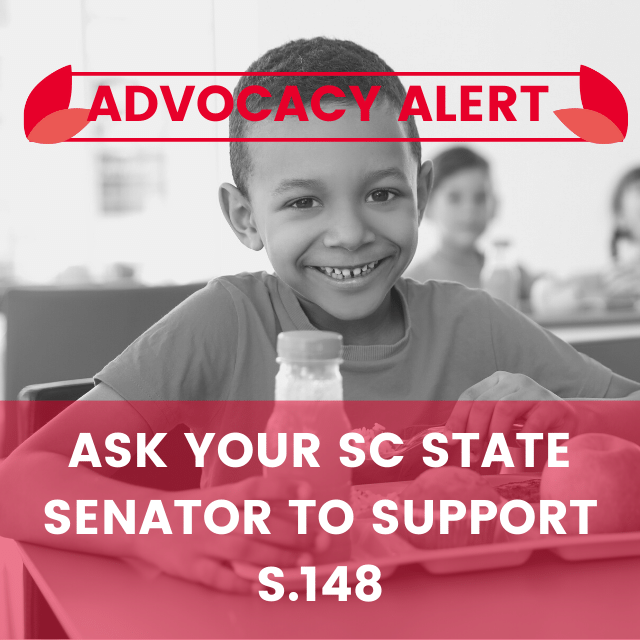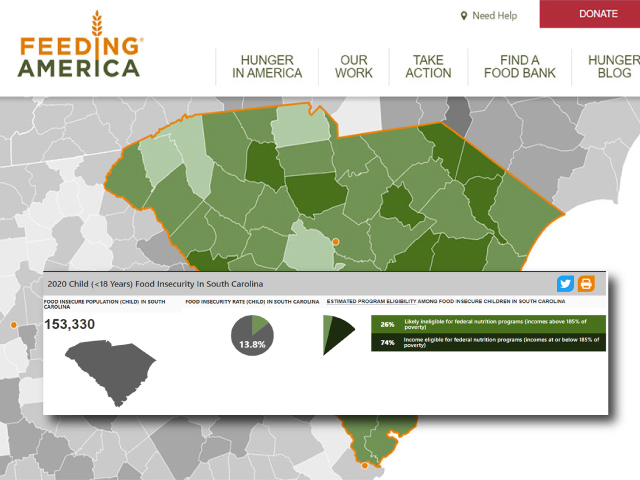
There’s a bill in the South Carolina Senate that, if passed, would give all SC public school students free meals every day. Sponsored by Senator Katrina Shealy (R-District 23), Senator Stephen Goldfinch (R-District 34), Senator Mia McLeod (D-District 22) and Senator Marion Kimpson (D-District 42), S.148 seeks to ensure all students get free breakfast and lunch by providing guidelines for eligible schools to participate in the USDA Community Eligibility Program (CEP). It also establishes a state-level reimbursement program for those schools that are not eligible for CEP and extends the lunch period to 30 minutes.
“This bill addresses multiple issues that schools, students, and parents are facing these days,” says Meg Stanley, executive director of Wholespire. “I’m talking about school budgets, administrative workload, hunger, poor grades and behavior, school lunch debt, food shaming, social pressures and added financial stress for parents.”
Yes, hunger is a real problem in South Carolina. According to the Map the Meal Gap study by Feeding America:
- 1 in 7 children are facing hunger
- 74% of children are income eligible for federal nutrition programs (at or below 185% of poverty)
For the last two years, parents didn’t have to worry about paying for school meals and school administrators didn’t have to worry about tracking and collecting lunch money. During COVID-19, the USDA enacted national waivers that allowed many schools to provide free meals and get reimbursed by the federal government. Now that the waivers have ended, schools are now returning to collecting breakfast and lunch money, parents are having to decide how to pay for and prepare lunches and students with debt are being served a crusty sandwich instead of a balanced hot meal and getting picked on by their peers.

“For too many students, eating breakfast and lunch at school is the only time in their day that they get a nutritious meal,” says Stanley. “If we want to improve the quality of education in South Carolina and make it equitable, we have to start somewhere and that’s with the bellies of our students.”
Breakfast and lunch are important to every student’s health and classroom performance. Nutritious meals provide energy that fuels the brain and helps with attention span, which influences test scores and grade-level advancement. When a child is hungry, it’s difficult to pay attention to anything else.
In 2022, Wholespire published a blog called Everything you need to know about the Community Eligibility Program. It makes the case for eligible schools to apply for CEP. The same benefits of CEP can be applied to S.148. If passed, here’s how schools, families and students will benefit from receiving free meals at schools:
Benefits for Schools
- Eliminates unpaid school debt. Every student gets free breakfast and lunch. Families don’t pay and administrators don’t have to worry about collecting money and managing accounts.
- Reduces administrative burdens.
- Improves school nutrition staff morale. Staff focuses more on nutritious meals and less on the nutrition budget.
- Can generate revenue for school nutrition budgets. Oftentimes, CEP leads to an increase in breakfast and lunch participation, which increases revenue for the nutrition budget.
- Can make it easier to serve meals in the classroom. Teachers only need to count the number of meals being served to students in their classroom rather than tracking free, reduced, and paid meals.
Benefits for Families and Students
- Improves student attendance and advancement. A study published in the Journal of Hunger & Environmental Nutrition found significant benefits for students attending CEP schools, including higher attendance rates and more students advancing beyond 10th grade.
- Fights hunger. The same study mentioned in the previous bullet also found students attending schools with CEP were nearly 3 times less likely to be food insecure.
- Promotes equity and reduces stigma. CEP eliminates the out-of-pocket costs for families and reduces the stigma or embarrassment some students may feel by participating in the meals program. CEP also eliminates school lunch shaming, as no student can be turned away or given an alternative meal from failure to pay.
- Reduces stress for families and students. Families with tight food budgets can rest assured that their child gets nutritious meals at school, reducing financial strain at home. Students don’t have to worry about paying for meals either.
Advocating for health in all policies is a priority for Wholespire, whose mission is to provide communities with proven and sustainable approaches that lead to increased access to healthy choices for ALL people. If you want to advocate for S.148, we encourage you to become a Wholespire advocate.
